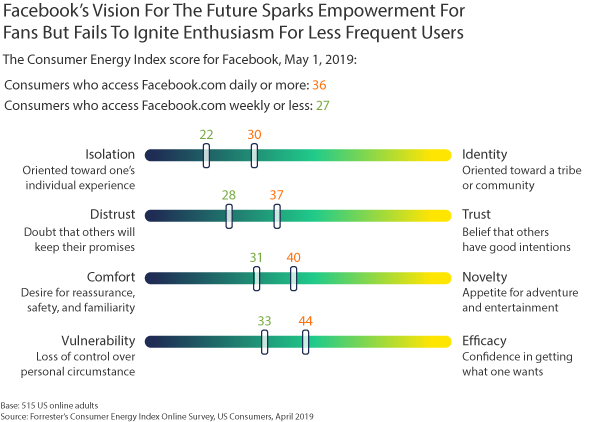Do Consumers Buy Facebook’s Vision For The Future?
Among a series of updates unveiled at Facebook’s F8 Developer Conference on Tuesday, Mark Zuckerberg echoed a common refrain: The future is privacy.
Fresh memories of Facebook’s mistakes and looming fines are not the only reasons why Zuckerberg’s refrain is relevant; in this cultural moment, consumers are clamoring for brands that build community around specific values. Large companies attempt pivots toward a values-driven strategy, and niche startups are pumped with VC cash because of their promise to make experiences more empathetic. By emphasizing goals like “the feeling of being together” and building “next-gen computing that is all about interaction and privacy,” Zuckerberg says all the right language that consumers are desperate to hear today.
Zuckerberg’s storytelling around shared purpose, human-to-human connection, and new privacy measures triggered riotous cheers at the event. But how did his message resonate broadly with consumers? After 2018 left consumers feeling skeptical of Facebook, if not downright violated, do users look at Zuckerberg’s new promises and detect a rose-hued filter — or do they feel genuinely inspired?
To find out, we took a pulse of consumer energy — the dynamic force that fuels consumers’ motivation to embrace a brand — hours after the conference.
Data shows that among a distinct group of consumers who watched the F8 conference keynotes, followed real-time updates, or immediately discussed the event with friends, the message resonated. At the end of December 2018, total consumer energy around Facebook was at 38 (on a scale from 0 to 100); 24 hours after F8, consumer energy among this loyal fan base surged to 45. These individuals felt a rush of connection to Facebook’s brand, trust in the company, excitement about the announcements, and a sense of empowerment given imminent changes. But these hyper-clued-in customers skew male and are the most frequent users of Facebook.com. A consumer energy read on the larger universe of consumers tells a different story.
For consumers who access Facebook.com at least daily, consumer energy levels after F8 mirrored those in December 2018: Consumers’ willingness to trust the brand increased by one point. For consumers who access Facebook.com once a week or less often, consumer energy waned to 27 as users felt disconnected, less trusting, uninspired, and unmotivated in response to Zuckerberg’s new promises.

What It Means
- Facebook’s vision for the future positively reinforces behavior among the most engaged users of Facebook.com. Rising consumer energy drives these users to view Facebook as a positive addition to their lives: Over a fifth of these consumers say they plan to use Facebook more when the updates roll out.
- Consumers who frequently log into Facebook.com feel largely indifferent and mildly positive. Their views of the platform won’t change with a short series of headlines but with tangible proof of Facebook’s new commitments — provided Facebook avoids any fumbles that fracture these users’ cautious trust in the brand.
- Consumers who are already disengaged from Facebook.com feel further repelled. Mounting skepticism and feelings of weariness show that Facebook’s imminent changes are not enough to revive their energy for the brand.
As Facebook strives to become the hub for “all the aspects of one’s life” by facilitating everything from payments to romantic matches, the company must earn and protect consumer trust like it’s sacred. By intensifying the sense of community around Facebook’s values, emphasizing empathy for consumers, creating moments of insight and discovery, and enabling consumers with a sense of control, Facebook can prepare subsets of its frequent users for its next big thing.
Forrester clients can connect with me via inquiry and nonclients through LinkedIn and Twitter to learn more about how consumer energy and consumer emotion fuel engagement with your brand.
